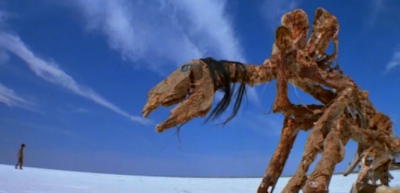Question of the Day: What Makes a Good Horror Film?
Wow, I haven't done one of these in a long time. Since I've been thinking about horror films all summer (and will continue to do so) I was thinking about what makes a horror movie great. So, what is it that makes a horror movie great for you? Is it the comfortableness of the genre (i.e. the gore, the violence, the gratuitous nudity, teens in peril, etc.) that gives the viewer the kind of nostalgia that a lot of people opine about when they speak of horror films (specifically the slasher films of the 80's)? Does it need to obey those rules or the tropes of the genre? Should it be sprinkled with humor, or have its tongue in its cheek? Does a good horror movie need atmosphere? Does it successfully displace you and make you feel uneasy about what's going on? Does it have to be realistic? For me there are a few examples of what I think make up a great horror movie (keep in mind I'm not saying these are the best horror movies, I'm just using them as examples):
Halloween: We'll start with the slasher film, and the obvious example at that, but it takes one of the primary hindrances for any horror movie (a limited budget) and creates one of the best looking horror films with its minimalistic and haunting score, and impressive use of the widescreen format. Evil creeps up on you in the peripheries, and not only that, but John Carpenter places a lot of the initial stalking scenes in plain daylight in a seemingly safe suburban neighborhood. Everything that screams normal and safe is inverted here, and it's all because of Carpenter's reliance on a classic mise-en-scene rather than ratchetiung up his film with false scares and buckets of blood.
The Beyond/City of the Living Dead: These two Italian horror films are the greatest, but they're perfect examples of what I like in a supernatural horror film. Characters come and go without any explanation, there is no sense of time or place, and the set pieces seem constructed out of Lucio Fulci's deranged nightmares. Buildings are almost always abandoned, towns deserted, and people do inexplicably evil and nasty things thanks to ancient books being unearthed or curses caused by priests hanging themselves. These two films are perfect examples of what it is to have an ethereal horror experience. The plot's are nonsensical mishmashes of ideas, and the threads that connect them are razor thin; however, you don't watch Italian horror for its riveting story...it's all about atmosphere, and Fulci's films (I'll throw Argento's Suspiria and Pupi Avati's The House with Laughing Windows in there as well) are dripping with it.
The Descent: Here you have just enough realism (the opening spelunking scenes) that it gives me the willies just thinking about it (I'm claustrophobic); however, you also have a crazy-as-hell monster movie in its second half. Neil Marshall's brilliant horror film is a perfect example of how to do the monster movie right (have fun), while still maintaining an appropriate tone (something he couldn't do in his follow-up Doomsday) throughout the film. You also have smart, strong female characters inahbiting this film, the "woman in peril" trope isn't as lame as it normally is because these women fight back, especially Juno, and they're give some time to create their charatcers so they don't just become props to be gnawed on by the crawlers. Sarah, the main character, is given some heartbreaking context, and her past hovers over the entrie length of the film until we're treated to one a heartbreaking and poignant final shot...something you almost never get in a horror movie. Marshall's film is also super referential, which makes for tons of geekout moments for nerdy horror fans such as myself.
There ya have it. That's what I think makes a good horror movie: either play it classically the way Carpenter did, play is ethereal and nonsensical where it's all about atmosphere like Fulci did, or play it referential and have fun like Marshall. I'll be interested to hear what you all have to say. Discuss in the comments.


























